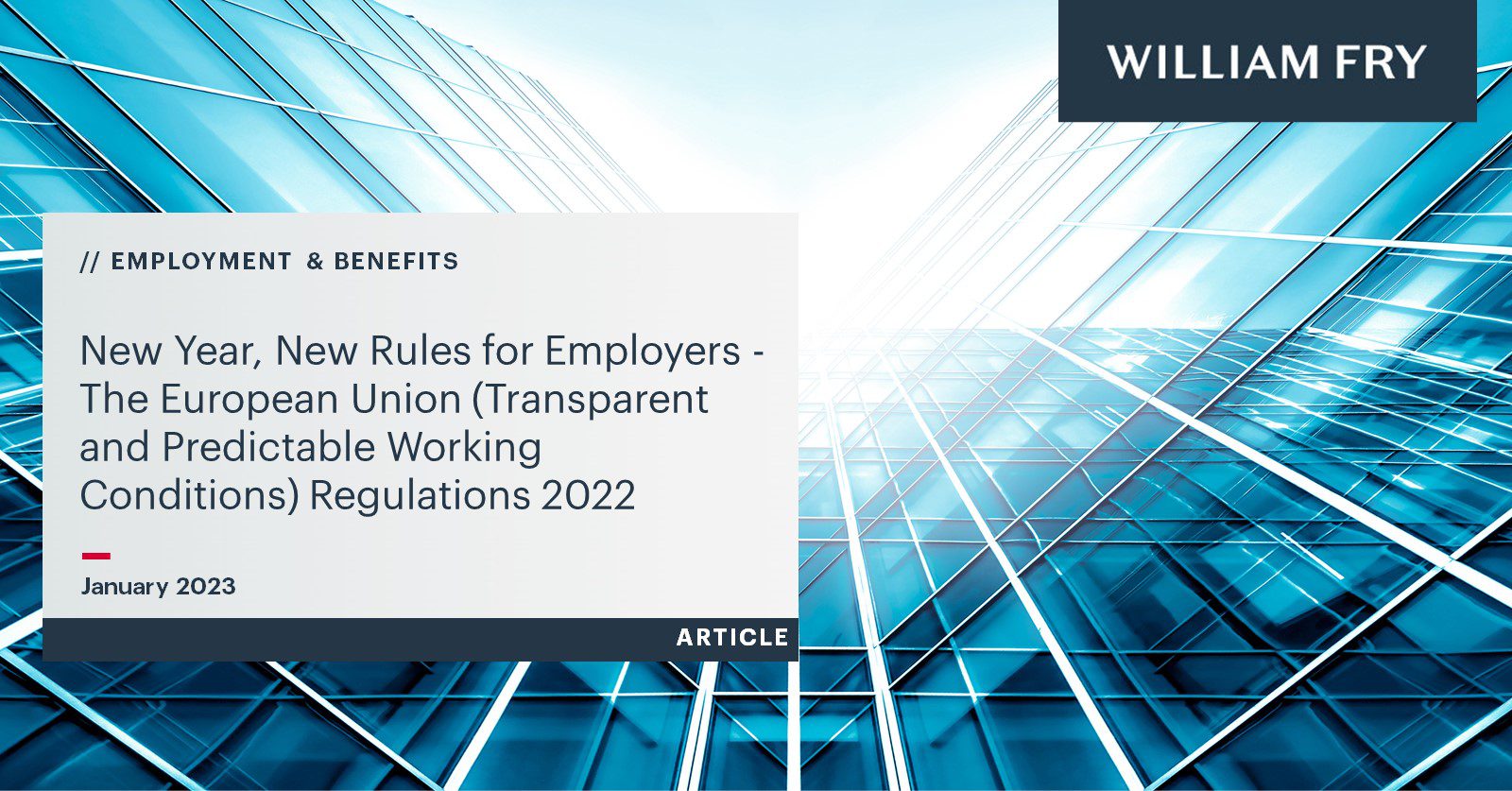The European Union (Transparent and Predictable Working Conditions) Regulations 2022 (the Regulations) were introduced on 16 December 2022. The Regulations transpose the EU Directive on Transparent and Predictable Working Conditions into Irish law.
The Regulations aim to provide greater clarity to employees on their terms and conditions of employment and to standardise certain contractual provisions, such as probationary periods and exclusivity clauses. The Regulations were introduced with little advance warning. Employers should note the following important provisions.
Definition of “Contract of Employment”
A contract of employment is now defined under the Terms of Employment (Information) Acts 1994 to 2014 (Act) to include “…any other contract whereby an individual agrees with another person personally to execute any work or service for that person…”. This expansion of the definition could bring workers, previously considered to be self-employed, within the scope of the Act.
Terms of Employment
The Act already required employers to provide a statement of certain terms and conditions to employees within two months. Employers must now provide an expanded list of terms to employees within five working days of their commencement date (the “5-Day Terms“). The 5-Day Terms now include:
- the date of commencement of the contract;
- information about remuneration;
- information about the place of work;
- information about the nature or description of the work;
- any terms or conditions relating to hours of work (including overtime); and
- if there is a probationary period, its duration and conditions.
Employers must also provide an employee with their statement of terms and conditions of employment (other than the 5 Day Terms) within one month, replacing the previous two month time period. This information now includes:
- any training entitlement;
- if the contract is temporary, the identity of the user undertaking;
- if the work pattern is entirely or mostly unpredictable:
- the principle that the schedule is variable;
- the number of guaranteed paid hours and the remuneration for work performed in addition to those guaranteed hours;
- the referenced hours and days within which an employee may be required to work; and
- the minimum notice period to which the employee is entitled before the start of a work assignment; and
- where is it the responsibility of the employer, the identity of the social security institutions receiving social insurance contributions attached to the contract of employment, and any protection relating to social security provided by the employer.
Employers must provide employees with a notice of changes to terms and conditions of employment on the day the change(s) take effect. Previously, an employer could provide such a notice up to one month after the changes took effect.
Parallel Employment
Under the Regulations, employees are permitted to take up “parallel employment”. Employers cannot prohibit an employee working for another employer outside their work schedule, subject to certain restrictions. Any restriction against parallel employment must be proportionate and include the objective grounds upon which the restriction is being imposed. It must be detailed in the employee’s employment contract or in a statement sent to the employee. The Regulations provide a non-exhaustive list of grounds of restriction, including health and safety, protection of business confidentiality, compliance with law (e.g., working time legislation) and avoidance of conflicts of interest. It is likely that many employers will be able to point to at least one relevant ground to assist in limiting parallel employment.
Probationary Periods
The maximum duration of a probationary period cannot now exceed six months, save in limited circumstances. The period can be extended to a maximum of 12 months in exceptional circumstances where it is “in the interest of the employee”. If an employee is absent from work during their probationary period, it may be extended for the duration of the absence, in accordance with a specified provision in the contract of employment.
For fixed-term contracts, a probationary period must be adequate and proportionate to contract’s expected duration and the nature of the work. An employee will not be subject to a new probationary period where a fixed-term contract is renewed for the same functions and tasks.
Employees who are subject to a probationary period of more than six months when the Regulations came into operation in December 2022, and who have already completed six months, shall have their probationary periods automatically expire on 1 February 2023, if not before.
More Predictable Work
Employees who have at least six months’ service, and have completed any applicable probationary period, are entitled to request a more predictable and secure form of employment. This likely refers to shift work with varying working hours, for example. The employer must provide a written response within one month of the request. An employee may only make such a request once every 12 months.
Training
Save for limited exceptions, employers must provide training to their employees that is free of charge, considered working time and, where possible, be within working hours, if the training is required by law or by collective agreement.
Take Away Points
The Regulations have introduced new and important amended rights for employees. Employers should review their template employment contracts and policies to ensure that they are compliant with these new obligations.
If you have any queries or would like further information, please get in touch with your usual William Fry contact or any member of the Employment & Benefits team.



